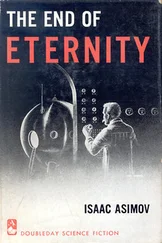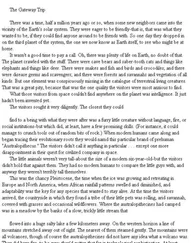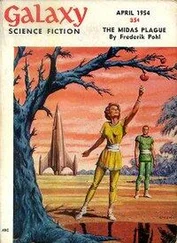Pohl, Frederik - The Siege of Eternity
Здесь есть возможность читать онлайн «Pohl, Frederik - The Siege of Eternity» весь текст электронной книги совершенно бесплатно (целиком полную версию без сокращений). В некоторых случаях можно слушать аудио, скачать через торрент в формате fb2 и присутствует краткое содержание. Жанр: Старинная литература, на английском языке. Описание произведения, (предисловие) а так же отзывы посетителей доступны на портале библиотеки ЛибКат.
- Название:The Siege of Eternity
- Автор:
- Жанр:
- Год:неизвестен
- ISBN:нет данных
- Рейтинг книги:4 / 5. Голосов: 1
-
Избранное:Добавить в избранное
- Отзывы:
-
Ваша оценка:
- 80
- 1
- 2
- 3
- 4
- 5
The Siege of Eternity: краткое содержание, описание и аннотация
Предлагаем к чтению аннотацию, описание, краткое содержание или предисловие (зависит от того, что написал сам автор книги «The Siege of Eternity»). Если вы не нашли необходимую информацию о книге — напишите в комментариях, мы постараемся отыскать её.
The Siege of Eternity — читать онлайн бесплатно полную книгу (весь текст) целиком
Ниже представлен текст книги, разбитый по страницам. Система сохранения места последней прочитанной страницы, позволяет с удобством читать онлайн бесплатно книгу «The Siege of Eternity», без необходимости каждый раз заново искать на чём Вы остановились. Поставьте закладку, и сможете в любой момент перейти на страницу, на которой закончили чтение.
Интервал:
Закладка:
In Kiev she was a very lucky tourist. As long as she was able to keep the thought of what might happen if they were discovered out of her mind, there was a lot to enjoy. The Great Gate Hotel was surprisingly comfortable (Great Gate, Great Gate-oh, right, she tardily recalled. Mussorgsky. Pictures at an Exhibition. "The Great Gate at Kiev." Which explained the continuing low murmur of music in the elevators.) The food was good-well, interesting, at least; there seemed to be more garlic in the borscht than she had expected. The service was uneven, but always friendly, with a lot of, "What a pity you come in winter! Kiev is so beautiful in spring, the chestnut trees in bloom, everything fresh and lovely." The only thing that troubled her (not counting that one big worry at the back of her mind) was the bed.
What was wrong with the bed in their room was that there was only one of it. It was a big bed, with a comfortable mattress and a giant-sized duvet to keep them warm. But there was only the one. The Ukrainians evidently felt that a married couple, particularly a honeymooning married couple, had no need of separate-but-equal accommodations.
For a moment Pat had actually tried demanding that Dannerman sleep on the floor, but all that had got her was a warning finger to the lips and being dragged to the bathroom. There, with the shower running full tilt to cover his whispers, he pointed out that Slavs had a notorious habit of bugging foreigners and they were, after all, supposed to be newlyweds.
It wasn't until they were actually retiring that night that it occurred to Pat to wonder just how newlywed they were supposed to act. But he got chastely into his side of the bed, and, decorously pajamaed, she got into hers, and that night, at least, the unseen observers, if any, didn't have anything interesting to watch.
Meanwhile, there was sightseeing.
What they had to do (Dannerman had explained to her) was to wait until they were contacted. By whom? By the "zek children" who were supposed to be Rosaleen's bodyguards, but who, he explained, might also be members of the Ukrainian nationalist terror group, who were planning to kidnap Dr. Rosaleen Artzybachova for purposes of their own. Meanwhile they were to conduct themselves just as the newlyweds (but combining business with their honeymoon) Herr Doktor and Frau Doktor Heinrich Sholtz would.
And once they were contacted? What were they supposed to do then?
That was where Dannerman's explanations became vague and unsatisfying. Rescue Dr. Artzybachova, of course, he said; but when she asked him why they didn't simply turn the matter over to the local po-t lice all he could say was that some of the police were probably also members of the terrorist group themselves. The two of them would have to thwart the terrorists' plan on their own.
He didn't say how.
Meanwhile they acted their parts. Dannerman conscientiously reserved for their third day in Kiev a car with a German-speaking driver to take them into the evacuated zone around the ruined Chernobyl nuclear power plant. When Pat said plaintively that it was dangerous there he said, for the benefit of any possible eavesdroppers, "But we must, ma pauvre petite, otherwise how can I explain our visit here to the people who pay expense accounts?" (And then, in the bathroom that night with the shower going, "But maybe we'll be lucky. We won't have to go if they contact us first.") They visited the Ryemarket and the ancient catacombs by the banks of the Dnieper River-less extensive than the more famous ones in Rome, but ghoulish enough to give Pat pause. It wasn't that she found those narrow underground passages frightening. It was just that she found it obscene to stare at the mummified remains of ancient monks; when you were dead you were certainly entitled, at least, to privacy. They attended a folk-dance recital one evening (much leaping and parading, but the costumes were certainly beautiful) and an opera on another (Boris Godounov, of course). They told everyone they happened to meet just what the Herr Doktor Sholtz and his Parisian bride were doing in Kiev-engaged in a lengthy statistical analysis of health problems resulting from the Chernobyl disaster, and therefore desirous of getting a look at the territory to make the numbers come alive. And they looked at every cathedral and museum the city had to offer.
The area which suffered the worst fallout from the old Chernobyl nuclear explosion is called the "Zone of Alienation," and it was evacuated immediately after the accident. It didn't stay evacuated. Old people came back because they didn't want to change their ways, and they died there. Their families came to bury them. Some stayed. So did their descendants, some of them hunting mushrooms in the forests and selling them in Kiev, some simply scrabbling out a living for themselves on the old farms. Over time they were joined by hermit types and a few people hiding from the police. In all, a few hundred people still live in this area of nearly 20,000 square kilometers.
Pat found that she was enjoying herself. She was amused when a woman with a notepad in her hand urged them to sign a recall petition for the Ukrainian UN delegate-until the woman found out they didn't speak Ukrainian and obviously weren't eligible to sign. She was surprised to see how much Kiev resembled any American city-cops patrolling in pairs against possible urban violence; hawkers selling their inflation-proof merchandise just as though they were in New York (though in Kiev the knickknacks were heavily weighted toward old Soviet-style medals and decorations). It was, actually, kind of fun-provided you were careful not to think too much about what might go wrong.
Surprisingly, Dannerman turned out to be an easy traveling companion. Well, she shouldn't have been surprised, Pat thought, remembering the long-ago days when they played together as children on Uncle Cubby's estate; but that had been years past and a world away. The two of them had changed. She had become a rather respectable astronomer, and he, damn him, had turned into a lousy gumshoe for the National Bureau of Investigation. What astonished her was how easily, living their roles as carefree sightseers, they had both turned back. They were even playing house again, just as they had when they were nine or ten years old-though, she reflected with an interior grin, without any of those you-show-me-yours-and-I'11-show-you-mine games they had graduated to a little later.
Of course, that sort of thing wasn't out of the question even now. Might actually enhance their cover as honeymooners, if indeed they were being watched.
Amused at herself, Pat brushed her teeth, and even picked up Dannerman's clothes where he had dropped them over the edge of the tub as he changed into his pajamas. As she was folding his pants she discovered something odd: there was an unexpected sort of interior pocket at the waistband, and what was in it was a peculiar little glass pistol. She sniffed it. There was a faint odor of vinegar. . . .
It was one of those strange little chemical steam guns they called bomb-buggers.
Hell, she thought glumly.
They were not children anymore, of course. And they weren't playing a game here in Ukraine.
So when they climbed into the big, welcoming bed, Pat turned away and stayed virtuously on her own side. So did Dannerman, and those unseen observers, if any, got nothing interesting to look at that night.
The next morning it was snowing again.
Pat viewed it with mixed emotions. Maybe they wouldn't go into the evacuated zone after all?
But Dannerman was firm. The car was hired, the snow was only a light dusting, he was definitely going, she could stay in the hotel if she was that frightened of a little residual radiation, but that would make her whole presence here pointless, wouldn't it?
All through breakfast she considered that option, but who was Dannerman to tell her she was frightened?
Читать дальшеИнтервал:
Закладка:
Похожие книги на «The Siege of Eternity»
Представляем Вашему вниманию похожие книги на «The Siege of Eternity» списком для выбора. Мы отобрали схожую по названию и смыслу литературу в надежде предоставить читателям больше вариантов отыскать новые, интересные, ещё непрочитанные произведения.
Обсуждение, отзывы о книге «The Siege of Eternity» и просто собственные мнения читателей. Оставьте ваши комментарии, напишите, что Вы думаете о произведении, его смысле или главных героях. Укажите что конкретно понравилось, а что нет, и почему Вы так считаете.












